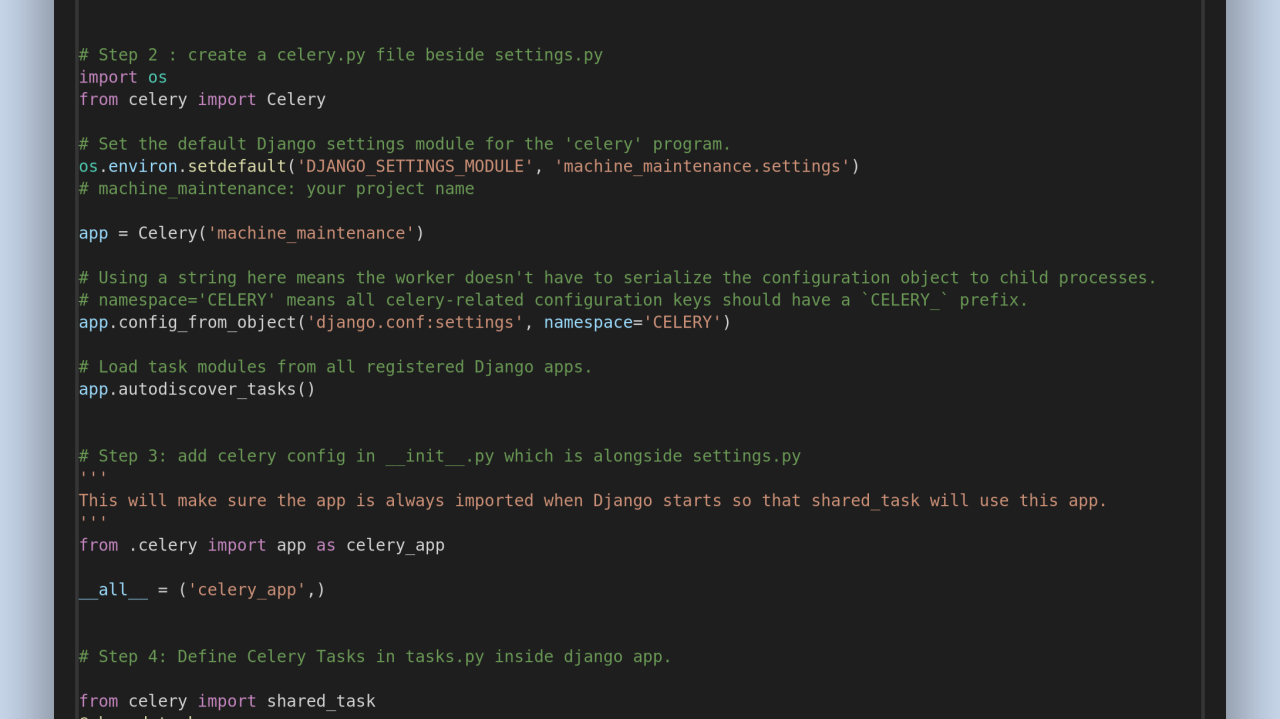
?? Implementing Celery in a Django Project??
MD ABDUL ALIM
Software Engineer | Python, Django, React, mysql, postgresql, celery, rabbitmq, aws, digitalocean
Celery is a powerful distributed task queue that allows you to handle long-running tasks in background without blocking the main application.
How to Implement Celery in Your Django Project:
Step 1: Configure Celery in #django settings.py
# Celery settings
CELERY_BROKER_URL = env('CELERY_BROKER_URL') #env('redis://localhost:6379/5'). Here 5 is redis database number.
CELERY_RESULT_BACKEND = env('CELERY_RESULT_BACKEND') #env('redis://localhost:6379/5')
CELERY_BROKER_CONNECTION_RETRY_ON_STARTUP = env('CELERY_BROKER_CONNECTION_RETRY_ON_STARTUP') #True
CELERY_TIMEZONE = "Asia/Dhaka"
CELERY_TASK_TRACK_STARTED = env('CELERY_TASK_TRACK_STARTED') #True
CELERY_TASK_TIME_LIMIT = 30 * 30
Step 2: Create celery.py
import os
from celery import Celery
# Set the default Django settings module for the 'celery' program.
os.environ.setdefault('DJANGO_SETTINGS_MODULE', 'machine_maintenance.settings')
app = Celery('machine_maintenance')
# Using a string here means the worker doesn't have to serialize the configuration object to child processes.
# - namespace='CELERY' means all celery-related configuration keys should have a `CELERY_` prefix.
app.config_from_object('django.conf:settings', namespace='CELERY')
# Load task modules from all registered Django apps.
app.autodiscover_tasks()
Step 3: Add celery app configuration in _ _init_ _.py
领英推荐
# This will make sure the app is always imported when
# Django starts so that shared_task will use this app.
from .celery import app as celery_app
__all__ = ('celery_app',)
Step 4: Define Celery Tasks in tasks.py
# tasks.py from celery import shared_task
from celery import shared_task
@shared_task
def update_rent_billing_status_task(rmblm_id, ids_for_is_billed, machine_reference):
# ... your task logic here ...
Step 5: Call your celery task wherever you need.
update_rent_billing_status_task.delay_on_commit(
rmblm_id=rmblm.id,
ids_for_is_billed=rmbl_item['ids_for_is_billed'],
machine_reference=rmbl_item['machine_reference']
)
Step 5: Run celery locally
celery -A machine_maintenance worker --loglevel=info
Here `machine_maintenance` is django project name.
#django #python #celery #asynchronous #python_developer #django_developer #software_engineer #TaskQueue #backend_developer #webDevelopment
Associate- Product and Pre-Sales | Cybersecurity | Enterprise Solutions
7 个月Very helpful!